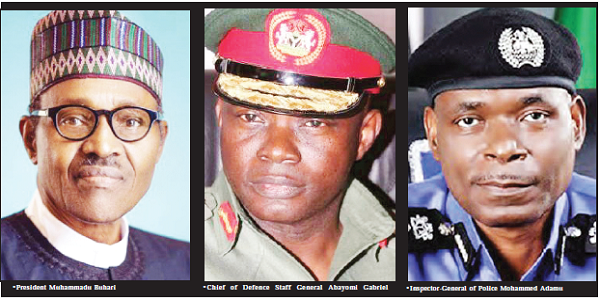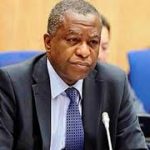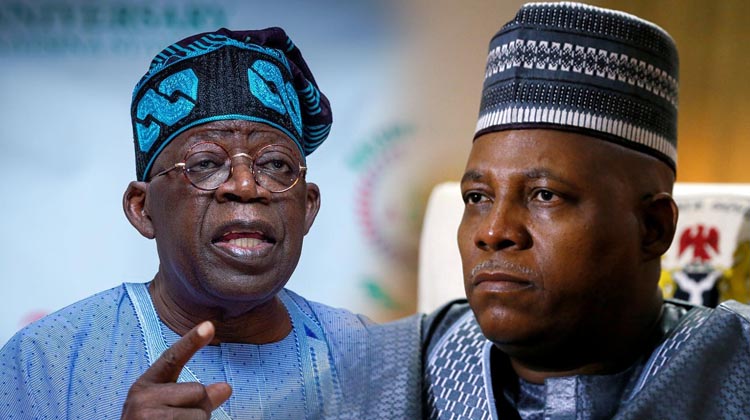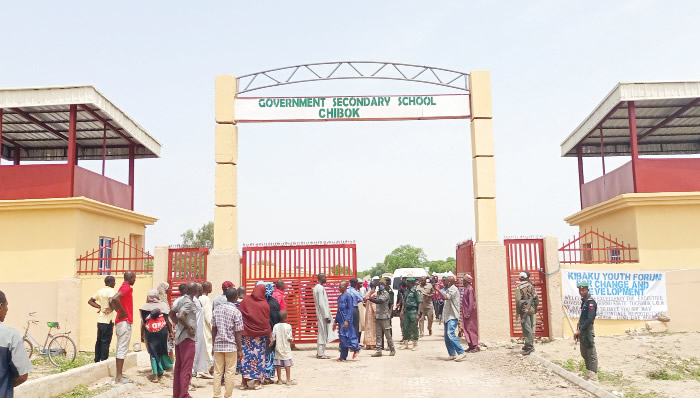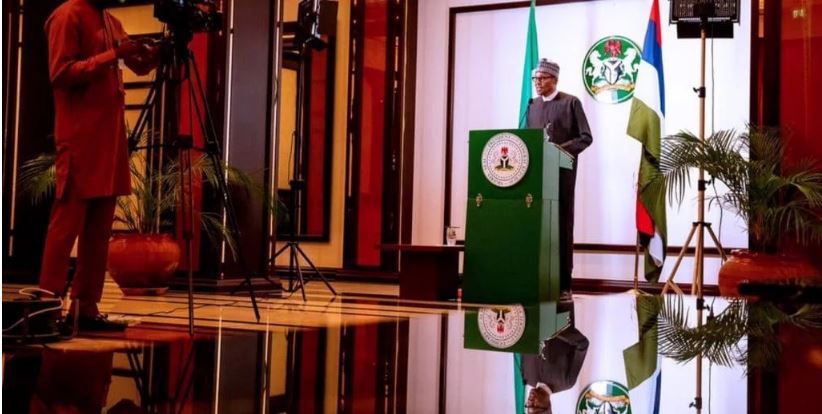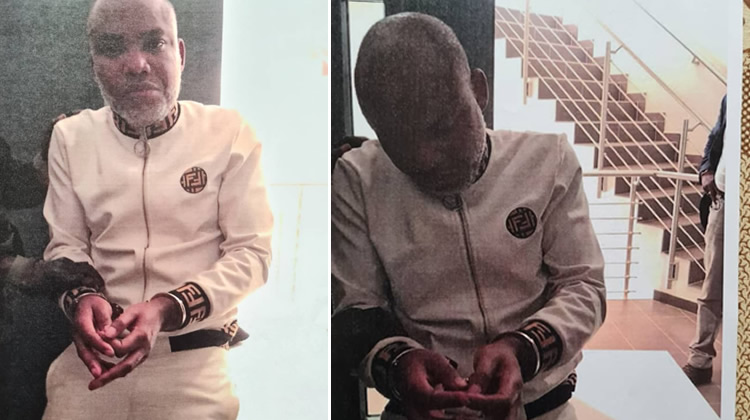The lockdown, movement restriction and other measures directed by the various governments across the country are intended to contain the spread of the coronavirus disease (COVID-19) and, by extension, protect citizens’ lives. But some have become victims of the same measures intended to protect them. Many are daily exploited, extorted and brutalised, while others have been killed by security agents enforcing the anti-COVID-19 measures.
The Lagos State Police Command announced on April 9, the arrest of Assistant Superintendent (ASP) Adebayo Ojo and Sergeant Mojisola Adeleke for allegedly extorting N10,000 from a woman, Oluwatosin Ajogbor, in the Agbowa-Ikosi area of the state.
Its spokesman, Bala Elkana, said Ojo, who is the Divisional Traffic Officer (DTO), Agbowa Division and Adeleke, a female sergeant, were arrested after an analysis of a video in which Ajogbor narrated her ordeal in the hands of the law officers.
On April 15, the National Human Rights Commission (NHRC) raised the alarm that security agents, who ought to protect the citizens, have killed more people than the pandemic.
NHRC’s Executive Secretar, Tony Ojukwu said his agency, between March 30 and April 13, received 105 complaints of human rights violation from hapless Nigerians, who all blamed their ordeals on security agents. Ojukwu noted that, of the 105 complaints received from 24 states, eight related to 18 extra-judicial killings.
“Of this number, 12 deaths were recorded in Kaduna State. Abia State recorded two deaths arising from two incidents, while Delta, Niger, Ebonyi and Katsina states recorded one death each.
“Whereas COVID-19 has led to the death of about 11 patients till date (April 14), law enforcement agents have extra-judicially executed 18 persons to enforce the regulations.
“This speaks volumes of the protocols and rules of engagement for our law enforcement as well as the efficiency level and capacity of law enforcement agents to deal with the civil population. It’s a sheer display of impunity and reckless disregard for human life in law enforcement by security personnel.
“The report further shows that of the 18 deaths, the Nigeria Correctional Service was responsible for eight deaths, while the Nigeria Police Force was responsible for seven.
“The Army on the other hand was responsible for two deaths, while the Ebonyi State Task Force on Covid-19, Afikpo South Local Government, was responsible for one.
“Other types of violations recorded within the period included 33 incidents of torture, inhumane and degrading treatment, 27 incidents of violation of right to freedom of movement, unlawful arrest and detention, 19 incidents of seizure/confiscation of properties, 13 incidents of extortion, four incidents of SGBV (sexual and gender based violence), and one incident of discrimination in the distribution of food items,” Ojukwu said.
Public condemnation
The turn events has continued to attract reactions from individuals and groups with Deputy Senate President Ovie Omo-Agege and predecessor Ike Ekweremadu calling on President Muhammadu Buhari to take steps to prosecute the perpetrators and stem the tide.
Omo-Agege, in a statement by his spokesperson, Yomi Odunuga, was of the view that the prompt arrest and prosecution of the personnel involved in the killings would serve as a deterrent to other trigger-happy security men. He referred to the case of a youth who was reportedly killed during the lockdown in Sapele, Delta State and noted that the stay-at-home order was meant to protect people from the COVID-19 pandemic.
Ekweremadu condemned the highhandedness of security agencies enforcing the lockdown in parts of the country and expressed sadness over the report by the NHRC, to the effect that 18 Nigerians have already lost their lives.
“This is most unfortunate and condemnable, especially when we consider that the number of coronavirus fatalities in the country, stands at 12, as at today. I call on President Muhammadu Buhari and the relevant security and government agencies to ensure that the reprehensible acts are thoroughly investigated and the culprits brought to book.
“We must ensure that law enforcement agents do not turn their weapons against the very citizens they are supposed to protect,” Ekweremadu said in a statement by his spoksman, Uche Anichukwu.
Also, a group, the Human Rights Writers Association of Nigeria (HURIWA) urged the international community to prevail on the Buhari-led administration to stop the killing of impoverished citizens under the guise of enforcing lockdowns.
“We condemn all these atrocious state-sponsored killings by the police, the Nigerian Civil Defence Corps and the Nigerian Army. The killing of Nigerians, hungry and desperate to buy food for the starving members of their families who are locked up without much-needed food relief, is a crime against humanity.
“The police operatives responsible for these attacks in Anambra, Abia, and the soldiers and Civil Defence Corps personnel that deployed lethal weapons to kill unarmed citizens in Aba, Warri and Sapele in Delta State must be arrested, prosecuted and punished severely. Otherwise, they would be sent to the International Criminal Court in The Hague Netherlands for crimes against humanity.
“The policemen who killed five traders in Kaduna, while seeking to enforce the draconian COVID-19 curfew ordered by Governor Nasir El-Rufai have still not been caught, prosecuted and sanctioned in accordance with the principle of the rule of law.
“This show of official impunity and reckless disregard for the rights of Nigerians is the reason we are appealing to world leaders to speak out and put President Buhari under pressure to name, shame and dismiss and punish the killer security operatives responsible,” HURIWA said in a statement by its National Coordinator, Emmanuel Onwubiko, and National Media Affairs Director Zainab Yusuf.
Before the lockdown
Critics have argued that impunity and rights abuse are attributes inherent in a typical security agent in the country. They stated that even when not provoked, operatives of security agencies have, on several occasions, gone out of their way to create trouble.
They cited the March 23, 2020 attack on the head office of the NHRC in Abuja by some armed policemen, who shot sporadically into the building after tear-gassing it during work hours, while officials of the commission were going about their duties.
Ojukwu explained the incident thus: “At about 12.00hours this afternoon, being 23rd March 2020, the commission was having a management meeting at the council chambers when we heard sporadic gunshots outside.
“When the management, comprising all the directors and the executive secretary came out of the chambers, we saw that the entire compound had been covered with smoke and we all ran back into the council chambers, because of the tear gas.
“When the effect of the tear-gas reduced, the management went downstairs to assess the situation.”
Past attacks on the NHRC
According to him, the March 23 incident was not new.
“This is not the first time the commission was attacked directly by officers of the Nigeria Police Force. Several officers of the commission investigating complaints of human rights violation have, in the past, been assaulted and intimidated by officers of the Nigeria Police.
“It will be recalled that on April 23, 2018, the commission was also attacked by officers of the Nigeria Police with tear gas which destroyed cars and smashed windows. This was reported to then Commissioner of Police, FCT (Federal Capital Territory) and the then Inspector General of Police (IGP).
“Nothing to the knowledge of the commission was done by the authorities despite all the complaints of the commission. The commission bore the brunt of replacing all damaged properties, including staff and visitors’ vehicles that were damaged during that incident.
“The leadership and staff of the commission have been severally threatened in the course of their official duties by police officers. This portends grave danger for the defence of human rights and fundamental freedoms in Nigeria.
“The premises of the commission just like the courts should be one of such place where every Nigerian should feel free, where human rights must be respected and staff should be able to carry out their constitutional mandate without fear of intimidation.
“We view this as an attack on the commission and further confirms our belief that most of the officers of the Nigeria Police act with impunity with regard to their law enforcement duties,” Ojukwu said.

Why impunity and rights abuse persist among security agents
Rights activists and lawyers, including Daniel Makolo and Sunday Esseinekak, said impunity and the tendency to abuse citizens’ rights were common among security agents because of the absence of deterrence and the unwillingness of the government to engage in effective institutional reforms.
They argued that cases of abuse were rampant because the Federal Government, that controls these agencies, had failed to reform them and prioritise enforcement of discipline.
They cited past attempts by the Federal Government at reform which were not carried through owing to political considerations. The most recent of such were the two panels constituted by the Buhari-led administration to investigate the military’s prosecution of the Boko Haram war and the allegations of impunity against the Special Anti-Robbery Squad (SARS).
Both panels submitted their findings and recommendations to the Federal Government since last year, but it is yet to act on it, a practice that has become a tradition with successive governments.
According to Makolo, the Buhari-led government is reluctant to adopt and implement the reports of both panels because it knows those who will be more negatively affected.
“You will notice that, lately, every wrong under this regime is seen from a clannish perspective. And you will find that, if the reports of these probes were to be made public, the perpetrators of the abuses are mostly from the favoured clan. So, the reports would never be seen.
“They (the reports) will also not be acted upon. The clan cannot punish its own, especially when the member on an errand. So, that is the way it is. The reports will never be acted on, at least not under the Buhari government,” Makolo said.
For Essienekak, it would be difficult to wean the security agencies off the culture of impunity and abuse without first, engaging in fundamental overhaul. He contended that the philosophy behind the establishment of these agencies, particularly the police, by the colonialists, was to serve as agents of oppression, with their members trained to be brutish and callous, a philosophy that persists.
Essienekak, who is the executive director of Abuja-based rights advocacy group – Stand for Rights Initiative (SRI) – said it was unfortunate that, many years after the nation’s independence, a typical policeman today did not understand that his service ought to be for the people.
He argued that some policemen still saw themselves as agents of those in government, who have sustained the colonialists’ oppressive tradition, assumed their oppressive role and imbibed their extortionist philosophy.
“For me, the issues of human rights abuse and impunity are inherent in the police. Inherent in the sense that, from the foundation of this country, the police force has been wrongly bred. So, when you are begotten in inequity, there is nothing you can do, because that blood is still going to be there.
“The Nigeria Police Force is brutish. From the time it was set up by the colonial masters, members were trained to be brutal. You will recall that the main function of the police under the colonial rule was to suppress anyone who may want to challenge the existing authority then.
“For me, the police and other security agencies need to be urgently reformed. Their members need to be deracialised and reoriented. They need to change the guiding principles and philosophies of these agencies. Security agents should be made to understand that they exist to serve the people and not to oppress or take advantage of them,” Essienekak said.
Reports ‘ignored’ by government
Amnesty International in late 2016 published a report alleging that 240 people, including infants, died in military detention camps in the Northeast while 177 pro-Biafran agitators were allegedly extra-judicially killed in the same year.
Bothered by this report and other allegations of abuses against the military, the Federal Government, in August 2017, constituted a panel headed by Justice Biobele A. Georgewill of the Court of Appeal to investigate compliance by officials of the Armed Forces with human rights obligations and rules of engagement, especially in local conflict and insurgency situations.
As part of its terms of reference, the panel was “to review extant rules of engagement applicable in the Armed Forces of Nigeria and extent of compliance thereto.”
It was equally “empowered to investigate alleged acts of violation of international humanitarian and human rights law under the Constitution of the Federal Republic of Nigeria, 1999 (as amended), Geneva Conventions Act, African Charter on Human and Peoples’ Rights (Ratification and Enforcement) Act and other relevant laws by Nigerian security agencies.”
The panel went about its job, held public sittings in Abuja, Maiduguri, Port Harcourt, Enugu, Kaduna and Lagos where it heard from victims and witnesses, who described a range of alleged violations by security forces, including extra-judicial executions, torture, rape, enforced disappearances and the burning down of villages.
The panel submitted its report in February 2018 and since then nothing has been heard about its findings and what the Federal Government has done with them.
At the height of the intense clamour by Nigerians for the disbandment of the Special Anti-Robbery Squad (SARS) of the Nigeria Police following frequent reports of rights abuses associated with its operations, the Federal Government directed the National Human Rights Commission (NHRC) to investigate the agency and suggest needed reforms.
In compliance, the NHRC in September 2018 inaugurated a seven-man Special Investigative Panel.
The panel sat for months and at the completion of its assignment, submitted its report to President Muhammadu Buhari on June 3, 2019, who subsequently inaugurated a three-man committee, headed by the current Solicitor-General of the Federation and Permanent Secretary, Federal Ministry of Justice, Dayo Apata (SAN).
The Apata committee was given three months to, among others, study the SARS panel’s report and advise the government on the modality for the implementation of the various recommendations contained in the report.
Sometime in October 2019, the Apata panel, The Nation learnt, submitted its recommendations to the Presidency. Till date, the Federal Government has failed to take any further steps on the issue.
The panel on SARS, like other panels constituted by this government before it, made mind-boggling findings and suggested needed reforms that would have transformed the relevant institutions.
But the Federal Government is yet to act.
The SARS panel for instance, found cases of extra-judicial killings, extortion, use of torture as means of investigation, outright conversion of exhibits and other confiscated items by police officers.
In its report, the panel said it found among others, that “there were cases of violation of the right to life, resulting from beating, torturing, shooting and denial of feeding to suspects in police custody.
“This practice was done in the bid to get suspects to confess to the commission of crimes. There were cases where suspects died in police custody with no proper procedures followed in terms of carrying out autopsy, coroners’ inquest depositing or disposal of corpses.
“There were cases where complaints were made against the police for being responsible for the disappearance of persons, arrested by them, without trace. In such a situation, there is no way that families will get the corpses of their loved ones, give them decent burial and get closure over their years of painful search.”
The panel added that by such by the police, “cultural rights of citizens to burial have been grossly abused by the SARS mode of operations.”
As it relates to issues of torture, inhuman and degrading treatment, the SARS panel said it found among others, that “some (police) officers believed that they have the right to beat up suspects, force them to talk or injure them as the established practice of extracting confessions from suspects.
“The failure to record the wounds or injuries on suspects before being taken into custody was noted to be the case in the complaints before the panel. The injuries by the suspects were meted to them while in police custody.”
On the issues of arbitrary arrests and detentions, the panel equally found that “there were cases of arbitrary arrests and detentions of persons by some police officers on the pretext that they were suspecting them.”
It found that “some of the persons arrested and detained were later labelled by the police as armed robbers or responsible for crimes they did not commit.
“In the process of such arrests, police officers would resort to methods that are outside the legal guidelines, police methods and procedures and subjecting suspects to inhuman and degrading treatment in the form of beatings, hitting with gun butts, insults, threats, gunshots and intimidation.
“It was apparent that some of the operatives of SARS, mostly the upcoming young police officers, lack in-depth knowledge of Police procedures and processes which could partly explain their arbitrariness in arresting and detaining suspects or deliberate disregard to the law, rules of procedure and police regulations.”
On the complaints of abuse of the bail process and other forms of extortion, the panel said it “established cases of extortion by police officers of the SARS using various methods.
“This included asking suspects or their relations to pay money for the release of the suspect that were arbitrarily arrested; asking suspects whether they had money on them to give the police; and, making suspects to withdraw from ATMs to give officers.
“Bail had become a source of making money by the side as no records of bail funds collected appear to be recorded for accountability. Hence, the resort to arbitrary arrests and detention when officers of SARS are broke as a way to raise quick funds for their weekends, house rents or children School fees or personal development projects or to acquire and confiscate the property of others.”
The panel equally found that SARS officials engaged in the practice of converting property seized during investigation.
It noted that “properties, especially vehicles, were confiscated from the complainants and taken to the offices of the SARS pending investigations. The seized vehicles were not properly documented and were subsequently, without following due process, auctioned to police officers.
“As a result of the auction the owners of the vehicles were made to suffer deprivation of the use of their vehicles and property contrary to Section 44 of the Constitution.
“The confiscation of property by police officers raises questions on the character of some of the police officers operating under the auspices of SARS with further damaging effect on the reputation of the police as an institution charged with the responsibility of protecting life and property.
However, in this case, it was the police that became the perpetrators of confiscation of property from citizens.”
A rights activist and lawyer, Abubakar Dutse expressed disappointment that the Federal Government was reluctant to act on the findings and recommendations of the various panels and committees it has set up before now on the issue of right abuses and the need to deepen democratic culture by adhering to the rule of law.
Dutse said: “It is sad that this government is chasing shadows when there a lot to be done. What happened to the reports and recommendations of the panel that you spoke about? Why would a government constitute a panel, fund its activities with public funds only to turn around and discard the report of the same panel?
“That is a waste of public funds and a form of corruption. Why waste the nation’s scarce resources on the panel whose reports and recommendations you know you will not act on?” he said.


